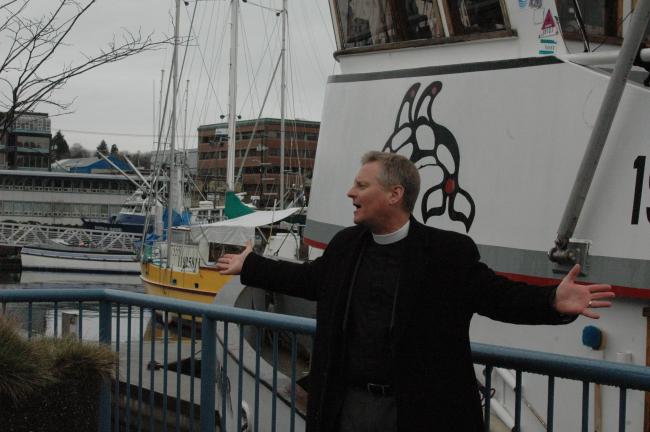83rd Annual Blessing of the Fleet honors fisherman for their sacrifice
Pastor Erik R. Wilson Weiberg blessed the Haida Warrior
Mon, 03/14/2011
By Christy Wolyniak, News Intern
The Ballard First Lutheran Church congregated at the Fisherman’s Terminal to honor the fishermen and women embarking on their next fishing season during the 83rd Annual Blessing of the Fleet on Sunday March 13, 2011.
Friends and family gathered to recognize the danger and sacrifice that these men and women face every day on commercial fishing boats.
Speakers included Pastor Laurie A. Jones and Pastor Erik R. Wilson Weiberg, Congressman Jim McDermott, Senator Jeanne Kohl-Welles, and King County Council members Bob Ferguson and Larry Phillips.
The Ballard First Lutheran Church choir led the audience in hymns such as “My Life Flows on in endless song”, and “Lord of the everlasting hills.”
Senator Kohl-Welles said, “[We] recognize how important the fishing industry is to Seattle and to Washington – it’s vital to the community. [The industry] provides $846 million in salaries and over 700 commercial fishing boats.”
Following the service, Pastor Erik R. Wilson Weiberg honored Skipper Dave Franklin’s boat, “Haida Warrior,” with a blue and white flag to fly from her mast.
Congressman Jim McDermott has attended this event for roughly 15 years now. His wife, Therese, comes every year. It is one of her favorite events to attend.
“It’s the nicest occasion we have in Seattle,” she said. “It’s important to acknowledge the economic consequence to the entire region [as the industry] contributes greatly to us. These [men and women] are in constant peril.”
“[The event] makes you think about people who died doing this and that this is a tough life for fishermen and women,” said McDermott.
Although the life of a fisherman is not an easy one, the men and women seemed to enjoy living on a boat for most of the year, making money and sharing memories with a solid crew.
Commercial fisherman, Rudy Johanson, has been helping on his dad’s purse seiner, the Alaskan Rose, since he was three years old. The next day they set off on a three-week journey to Sitka, Alaska. Here, the crew will spend long days and late nights fishing for herring before they return to the Puget Sound for a week break before going back out to sea.
For college-aged Johanson, the money, hanging out with the guys, and catching big sets are some of the biggest advantages of his job. He and Eddie Crable laughed together as they talked about how much money they might make in a day – $500 or sometimes much more depending on the catch.
“[Getting hired on a boat] is all about persistence,” said an enthusiastic Alaskan Rose deckhand, Eddie Crable. “Dock-walkers are what we call the guys just looking to join a boat. You better see your set of footprints on this dock more than once if you’re serious about getting hired. Maybe one out of one hundred dock-walkers will get hired.”
The crews on these fishing boats require their young members to take initiative and have common sense, as negligence is the main reason for any injuries, said Skipper Ron.
Bad weather and sleep-deprivation also can cause problems for fishermen who on occasion will stay up all night in order to get the best catch, according to Crable.
“Being out there is like being at war. Sometimes it’s very scary,” said Franklin, who has been in the industry since 1980, where he began as a cook on a purse seiner.
The grueling fishing industry has a higher level of risk than most careers yet these guys seem to love every minute of it.
“Catching fish is the best day in the world. Not catching fish is the worst,” explained Franklin about the fickle industry.
Crable said the men on the boats are called the FBI: friends, brothers, and in-laws. Whether or not the men and women are actually related, they soon become a close-knit family.
Skipper Ron laughed with long-time friend and skiff-man, Dennis Brown about their memories on Ron’s purse seiner: Josie J as hard work and hard play were greatly valued amongst the crew. It seemed a humble living, fishing. Gone most of the year, the ones who loved it were the ones who stayed, according to Brown.
“It’s a way of life. If you’re having fun doing what you love, then great,” said Ron, who enjoys relaxing in Sitka’s natural hot springs and crabbing in southeast Alaska with his crew when they are not fishing.
An estimated 55 million ‘pinks’ (salmon) are expected this year according to Franklin.
It is to these men and women, who risk their lives months at a time on the often-violent seas, that the community bestows its greatest thanks and appreciation.










